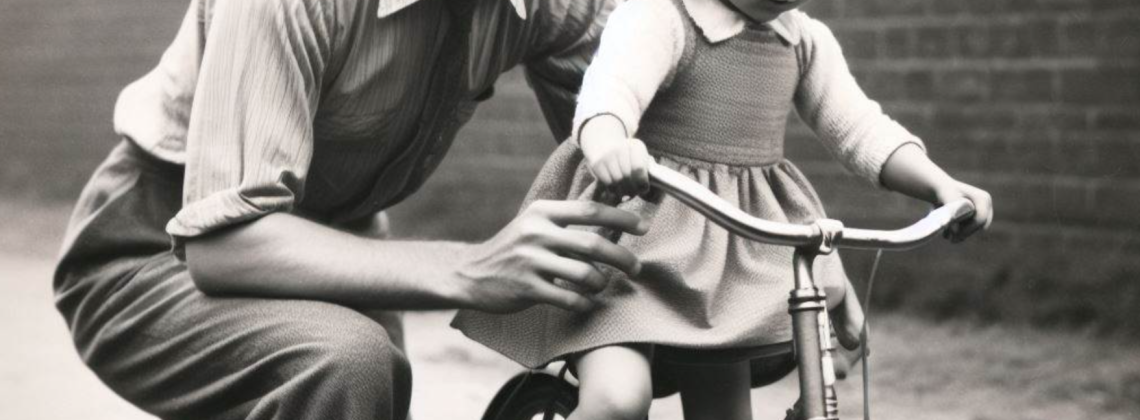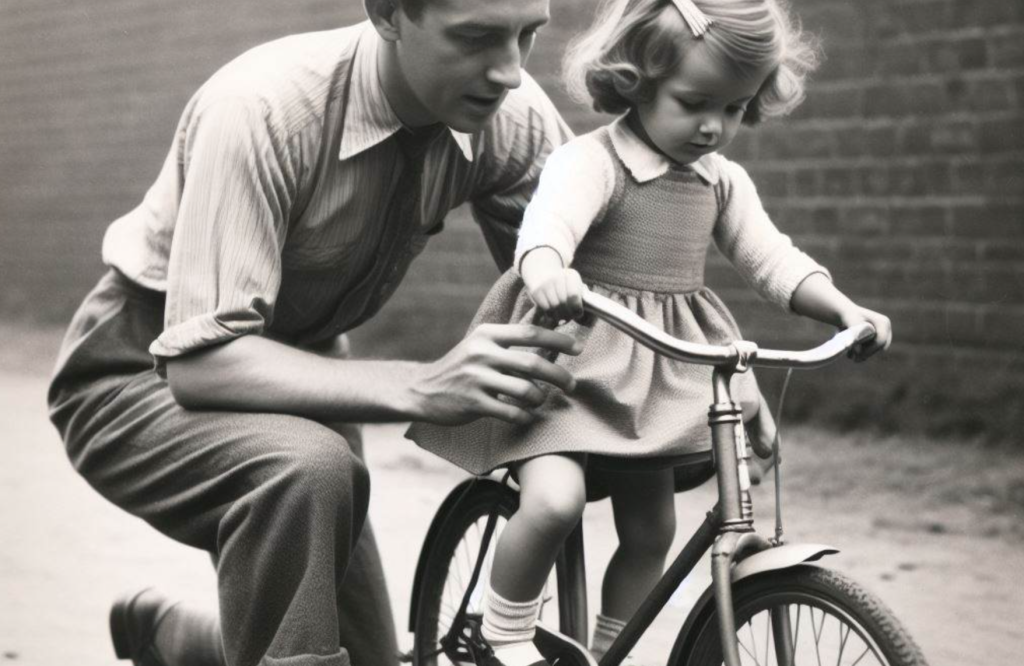

A nickname is the heaviest stone . . . (William Hazlitt, 1839)
Crinkled and colicky with inflatable chins, my baby pictures comprise a gallery of homeliness that, far from repelling my father, prompted him to cherish me all the more. Was it pity? Sleep-starvation? Or was he just delusional with love? As a child, I was much indulged: “Good Morning, Sunshine, what do you want for breakfast?” (Yes, really.) During my teens he employed me in his office and paid me generously. Mine was an embarrassment of fatherly riches, rendering all the more inexplicable his cruel nickname for me.
Sometime between the Sunshine breakfast era and the well-paying job, an additional twenty pounds discovered my hips. My gentle, reassuring dad was not gentle and reassuring about this. Rather, his cruel nickname (adjective + body part) stuck to me like shrinkwrap. No matter how I wept, begged, cussed, or complained, he replied that I had no sense of humor. One evening when I was sixteen, waiting by the window for a date with my first tires-on-fire love, my father called me [Cruel Nickname]. My face purpled and imploded—just as Tires arrived. How to suppress the snottifying tears? How to stop the mascara from Tammy-Faye-Bakkering down my cheeks? All while enduring the interminable foyer chat about dinner plans?
Looking back, I’d reason that my father seemed to channel Archie Bunker, that too-loveable bigot who called his wife Dingbat and his son in-law Meathead every Thursday night in our living room throughout the Seventies. Too, both of my parents had been svelte when young—had my father unwittingly transferred some middle-aged body-sorrow to me? Or had some unexplored nostalgia in him sought to recreate the fat, flustered, homely baby no other man could love? [Cruel Nickname] appeared long before “fat shaming” would make the OED and “Exploring fathers’ experiences discussing body image with their young daughters” would become a subtitle of an academic study. If my father thought at all about the impact of his opinion on my self-esteem, he was probably attempting to tough-love me toward success.
And yet, why should it matter whether my otherwise adoring dad approved of my looks? Why revisit, decades later, his rare unkindness? Because the nickname came not from a spit-wad sadist at school but from the person whose opinion most mattered. Because the cruelty was prompted not by some horrific deed but by an uninvited twenty pounds. Because it was a dooming indication that my appearance would forever fall short of the conventional femininity favored by my social and professional worlds as well. Because while he would see me as smart and capable and would ultimately choose me to manage his affairs, his disappointment in my appearance would be demonstrated long after the retirement of [Cruel Nickname] in his comments about other females (Now that’s a good-looking woman), namely, those with beauty parlor hair, dinner party makeup, and a bodyweight lighter than my favorite newsboy cap. Because said disappointment curled up into my ribs and tugged sharply downward. Because while his notable generosity would include a silver music box playing You are so beautiful to me, he could never muster a genuine “You look nice today.” Because, if James Baldwin is right about sentimentality being the mask of cruelty, [Cruel Nickname] was not the antithesis of Sunshine but its conjoined twin, each birthed amid the same social standards and cosmic morality pitting the luck and pleasure of one with the hurt and humiliation of the other.
When I next attempted to discuss [Cruel Nickname] with my father, he was elderly and our time was limited. I told him about the old wound, hoping he’d retract or explain or, as only my father could, soothe. He listened patiently, blinked his kindly gray-blues at me, opened his arms, and gathered me in for a huge hug.
“I was right,” he crooned. “You have no sense of humor.”
Over time, I’ve come to see [Cruel Nickname] as less about my anatomy than about our imminent separation. As a teen, I was weeping, wailing, slamming doors—and saving up for my first apartment. My soft-spoken dad, mourning his own parents and fast approaching both retirement and a heart attack, understood my departure as the end of a familial era. For the rest of his life he teared up whenever he mentioned it, and never ended a conversation without telling me he loved me.
In his nineties—with his long-term memory and short-term forgetting—he was more than ever like the gentle, reassuring dad of my childhood. His admiration, both during my earliest years and his latest ones, was free of the day’s standards for feminine beauty. He was no longer puzzled by my ensemble of lipstick, messy hair, hiking boots, and man blazers; he was no longer compelled to guide or instruct me into a cultural corset. Instead, his tender affection recalled our past and helped prepare us for yet another departure—this time, at ninety-nine, his own.
Lisa K. Buchanan lives in San Francisco and at http://www.lisakbuchanan.com. Notable, Best American Essays 2023; Pushcart Nomination, 2023; First Place, Short Fiction Prize, CRAFT, 2022.